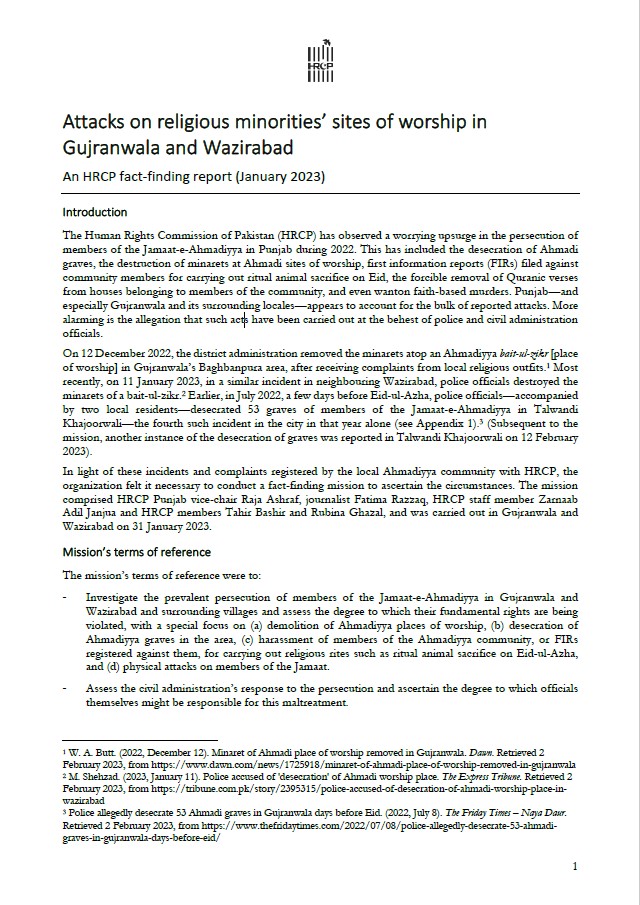
An HRCP fact-finding report (January 2023)
The Human Rights Commission of Pakistan (HRCP) has observed a worrying upsurge in the persecution of
members of the Jamaat-e-Ahmadiyya in Punjab during 2022. This has included the desecration of Ahmadi
graves, the destruction of minarets at Ahmadi sites of worship, first information reports (FIRs) filed against
community members for carrying out ritual animal sacrifice on Eid, the forcible removal of Quranic verses
from houses belonging to members of the community, and even wanton faith-based murders. Punjab—and
especially Gujranwala and its surrounding locales—appears to account for the bulk of reported attacks. More
alarming is the allegation that such acts have been carried out at the behest of police and civil administration
officials.
On 12 December
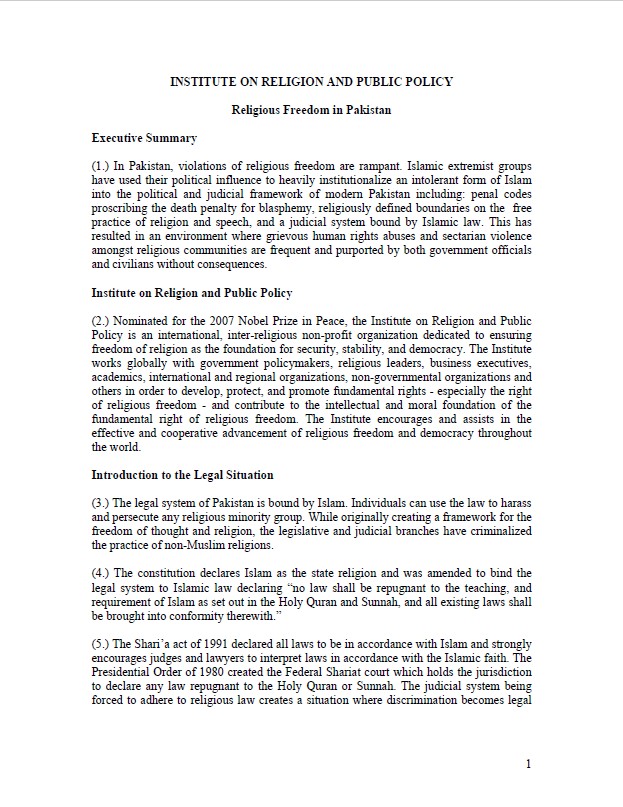
INSTITUTE ON RELIGION AND PUBLIC POLICY
In Pakistan, violations of religious freedom are rampant. Islamic extremist groups
have used their political influence to heavily institutionalize an intolerant form of Islam
into the political and judicial framework of modern Pakistan including: penal codes
proscribing the death penalty for blasphemy, religiously defined boundaries on the free
practice of religion and speech, and a judicial system bound by Islamic law. This has
resulted in an environment where grievous human rights abuses and sectarian violence
amongst religious communities are frequent and purported by both government officials
and civilians without consequences.
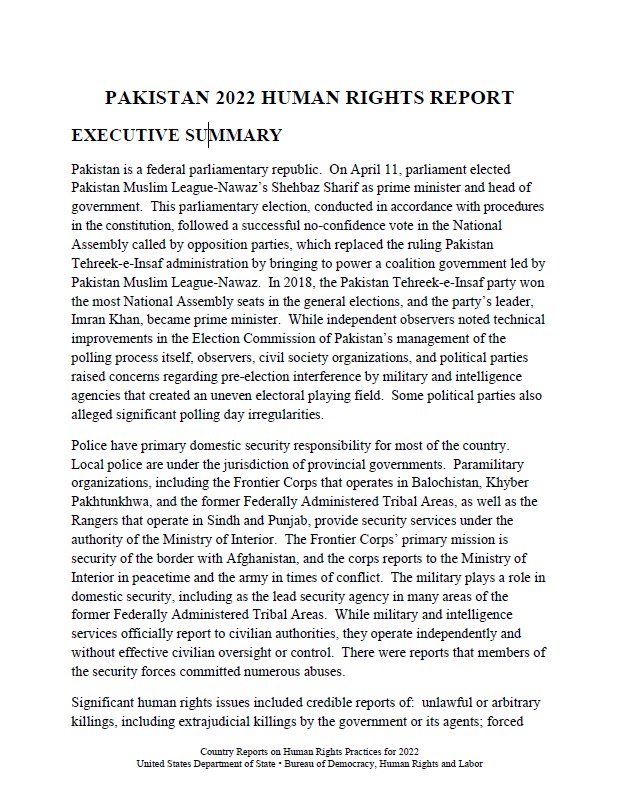
PAKISTAN 2022 HUMAN RIGHTS REPORT
Pakistan is a federal parliamentary republic. On April 11, parliament elected Pakistan Muslim League-Nawaz’s Shehbaz Sharif as prime minister and head of government. This parliamentary election, conducted in accordance with procedures in the constitution, followed a successful no-confidence vote in the National Assembly called by opposition parties, which replaced the ruling Pakistan Tehreek-e-Insaf administration by bringing to power a coalition government led by Pakistan Muslim League-Nawaz. In 2018, the Pakistan Tehreek-e-Insaf party won the most National Assembly seats in the general elections, and the party’s leader, Imran Khan, became prime minister.
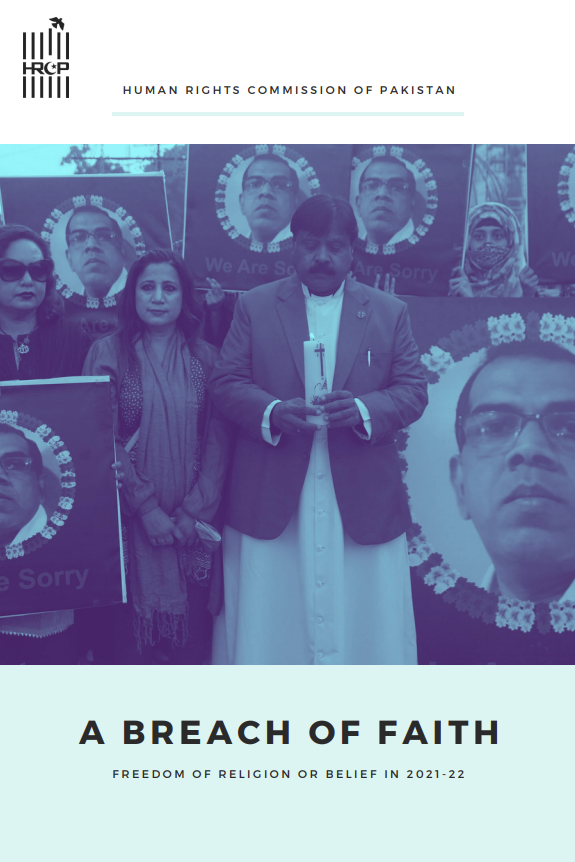
A BREACH OF FAITH – Freedom of religion or belief in 2021-2022
This report is part of an annual series documenting the state of freedom of religion or belief (FORB) in the country.2 It looks specifically at rights violations that occurred in this context between July 2021 and June 2022,
framing these incidents within Pakistan’s legal and sociopolitical framework. The report also seeks to assess the state’s response, which has, historically, fostered a climate of impunity for perpetrators of faith-based
discrimination and a visibly shrinking space for religious freedom.
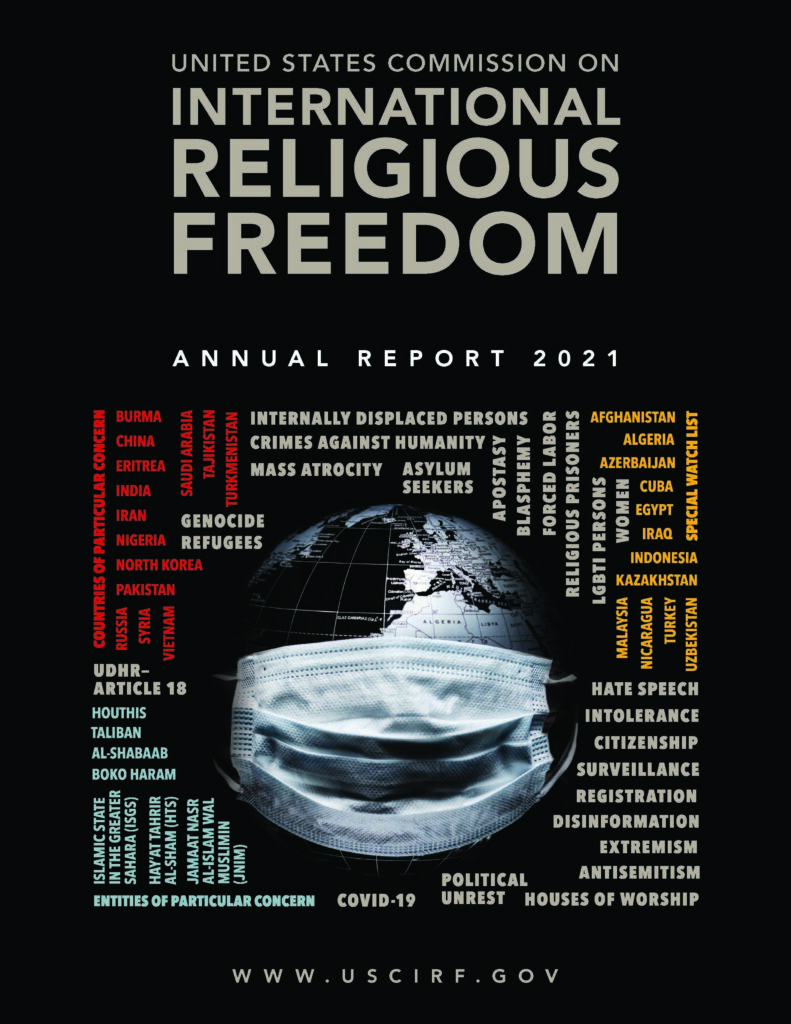
Annual Report 2021 by the U.S. Commission on International Religious Freedom
“Pakistan’s treatment of religious minorities is best assessed through the prism of its treatment of the Ahmadiyya community, who continued to face severe official and societal persecution for their beliefs and self-identification as Muslims. The year saw a surge in targeted killings of Ahmadis. Between July and November, five Ahmadis were murdered, including 57-year-old Tahir Naseem, an American citizen accused of blasphemy who was shot in a courtroom in July.
In May, the government formed the National Minorities Commission (NMC) required by a 2014 Supreme Court decision, however, Ahmadis were excluded. During debates surrounding their possible inclusion, Noor-ul-Haq Qadri, Pakistan’s Minister for Religious and Inter-faith Harmony Affairs, publicly stated, “Whoever shows sympathy or compassion towards [Ahmadis] is neither loyal to Islam nor the state of Pakistan.” The government did not address statements made by Qadri or other officials who incited hatred and intolerance towards Ahmadis and other religious minorities.” (Report page 36)
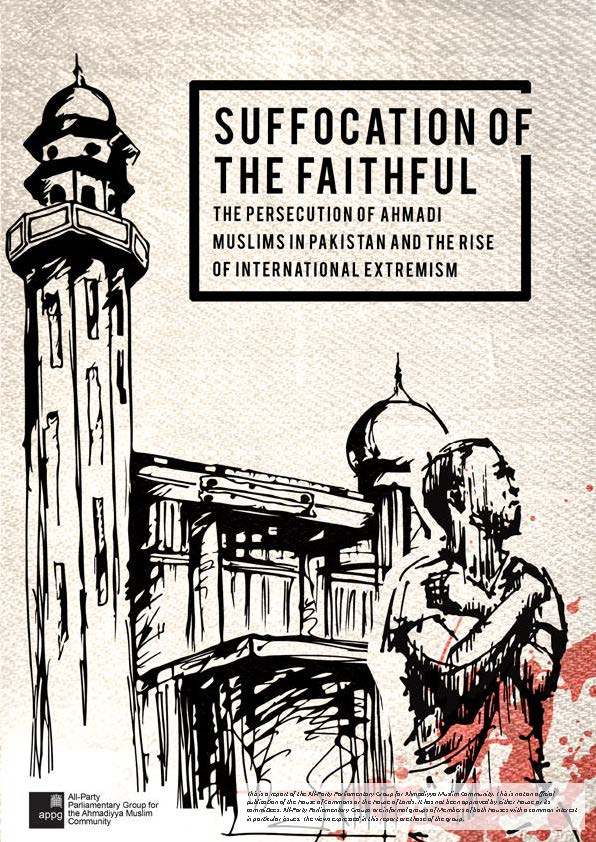
The All-Party Parliamentary Group for the Ahmadiyya Muslim Community has launched a report entitled: ‘Suffocation of the Faithful: Persecution of Ahmadi Muslims in Pakistan and the rise of International extremism’
The 150-page report is the first report of any such parliamentary group that details the issue of persecution of Ahmadi Muslims and its international impact. The report has 5 chapters:
- The Origins of State-Sponsored Persecution of Ahmadi Muslims in Pakistan
- The Persecution of Ahmadi Muslims from the Cradle to the Grave
- The Persecution of other Religious Communities in Pakistan
- The International Persecution of Ahmadi Muslims
- The Impact of Persecution on Extremism in the UK
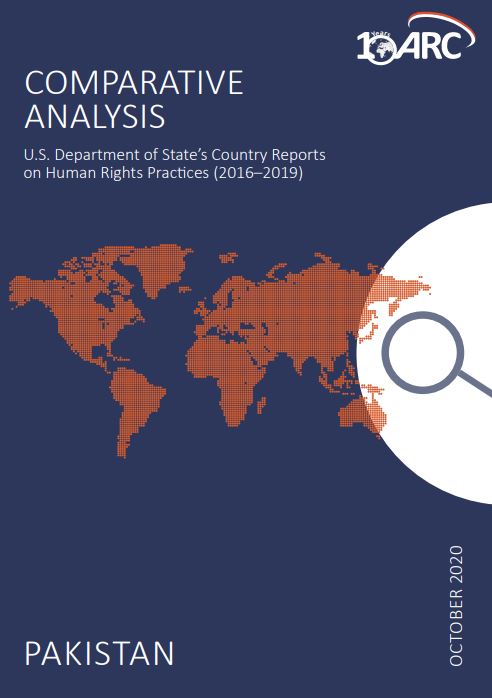
COMPARATIVE ANALYSIS – U.S. Department of State’s Country Reports on Human Rights Practices (2016–2019)
“Multiple Ahmadiyya community members died in what appeared to be targeted killings”.
[In 2018 only incident is mentioned “Unknown gunmen killed an Ahmadi man in his home on
June 25, in what appeared to be a targeted killing due to his faith.” In 2019, no mention of
targeted killings of Ahmadis in this section. Note that section 6 of all reports states “There
were occasionally reports of mob violence against religious minorities, including Christians,
Ahmadi Muslims, and Hindus” but this is a different point] (page25)
“Police often failed to protect members of religious minorities–including Ahmadiyya
Muslims, Christians, Shia Muslims, and Hindus–from attacks. Activists from Christian, Sikh,
Parsi, and Hindu communities reported widespread distrust of law enforcement within their
communities. They explained that community members frequently refrained from reporting
crimes, because they believed the police would not act.” (page 27)
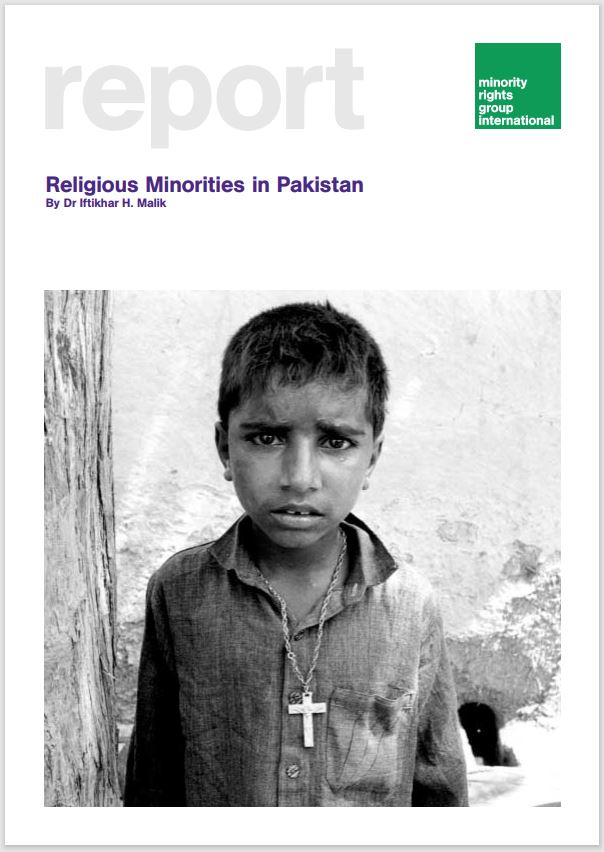
Report – Religious Minorities in Pakistan by Dr Iftikhar H. Malik
Minority Rights Group International Minority Rights Group International (MRG) is a non-governmental organization (NGO) working to secure the rights of ethnic, religious and linguistic minorities and
indigenous peoples worldwide, and to promote cooperation and understanding between communities. Our activities are focused on international advocacy, training, publishing and
outreach. We are guided by the needs expressed by our worldwide partner network of organizations which represent minority and indigenous peoples.
MRG works with over 130 organizations in nearly 60 countries. Our governing Council, which meets twice a year,
has members from 10 different countries. MRG has consultative status with the United Nations Economic and
Social Council (ECOSOC), and is registered as a charity and a company limited by guarantee under English law. Registered charity no. 282305, limited company no. 1544957.
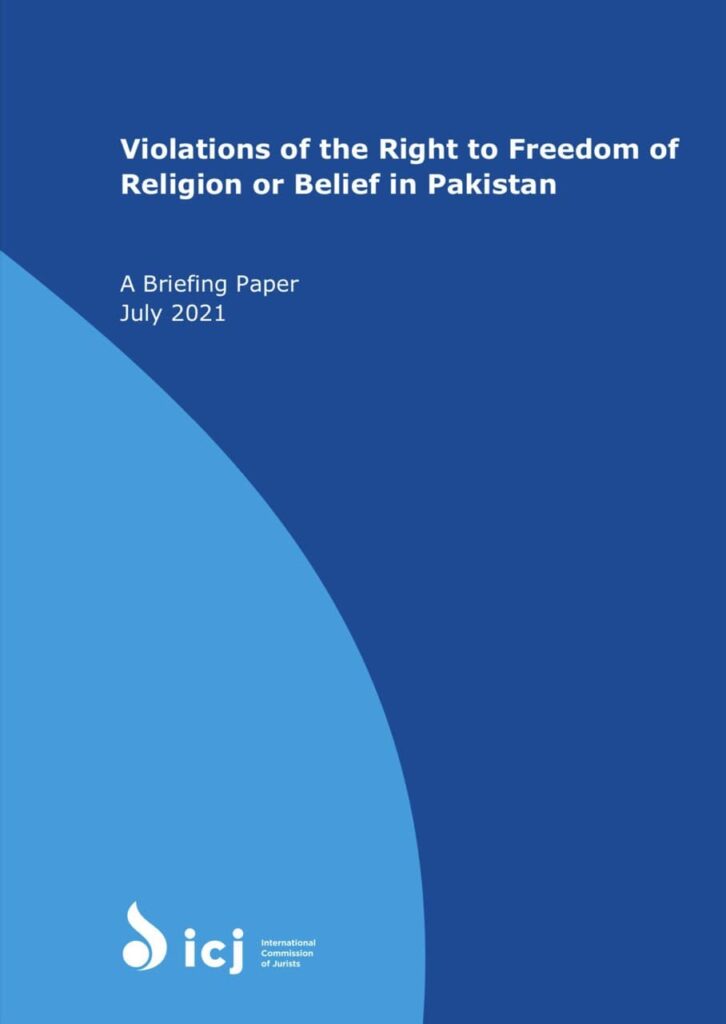
Violations of the Right to Freedom of Religion or Belief in Pakistan
Composed of 60 eminent judges and lawyers from all regions of the world, the International Commission of Jurists (ICJ) promotes and protects human rights through the Rule of Law, by using its unique legal expertise
to develop and strengthen national and international justice systems. Established in 1952 and active on the five continents, the ICJ aims to ensure the progressive development and effective implementation of international human rights and international humanitarian law; secure the realization of civil, cultural, economic, political and social rights; safeguard the separation of powers; and guarantee the independence of the judiciary and legal profession.
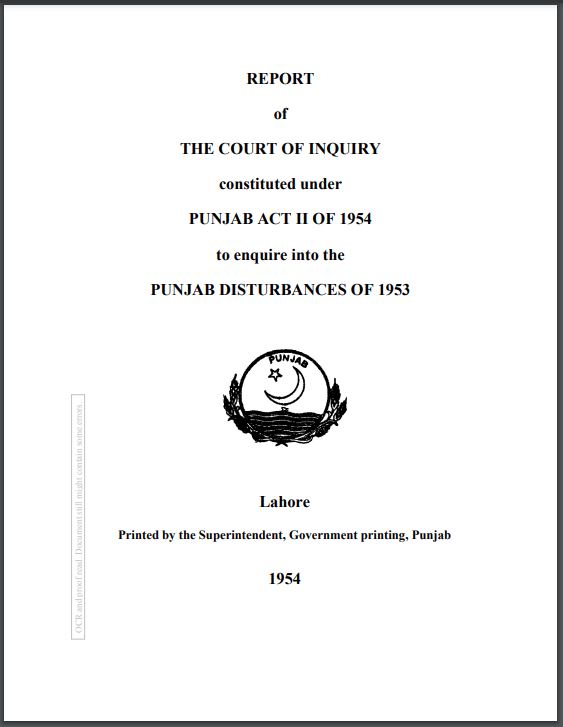
Munir Inquiry Report
This book is an official document published by the Government of Pakistan and is officially titled, Report of The Court of Inquiry constituted under Punjab Act II of 1954 to enquire into the Punjab Disturbances of 1953. It is commonly known as the “Munir Inquiry Report” or the “Munir-Kiyani Report”.
The anti-Ahmadiyya sentiment that had been brewing for decades turned into a violent movement in 1952. The opponents of the Ahmadiyya Muslim Jamaat upheld their demand to declare Ahmadis as non-Muslims, the commission asked for the definition of the word “Muslim” so that it could be easier for them to then see who could be declared “non-Muslim”. It is a great historical irony that all anti-Ahmadiyya “Muslims” could not agree on a single definition of “Muslim”.
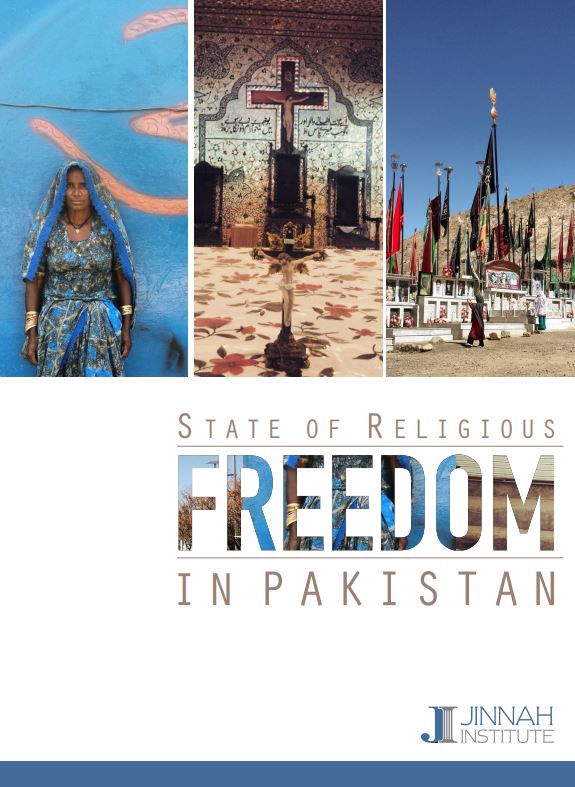
State of Religious Freedom in Pakistan – Minority Report Jinnah Institute 2016
“In addition to the pervasive social paranoia generated against the Ahmadi community by religiopolitical groups, the community has also been disenfranchised from participating actively in the country’s political system. A community that boasts Pakistan’s first Foreign Minister Sir Zafarullah Khan, and the country’s first Nobel Laureate and founder of the country’s atomic research program Dr Abdus Salaam, has been forced to stay away from active politics. Today, the community opposes the separate electorate, according to which Ahmadis can only cast votes as non-Muslims. The community supports a joint electorate through which they will not have to cast votes by declaring themselves non-Muslims.”

2017 – Eligibility Report by UNHCR (The UN Refugee Agency)
“Ahmadi individuals face discrimination as a result of State-sanctioned measures which impose limitations on the civil and political rights of Ahmadi individuals. Pakistani passports reportedly include information about the bearer’s religious affiliation. Muslims who apply for a passport are required to make a declaration to the effect that they denounce the Ahmadiyya movement’s founder as a false prophet and his followers as non-Muslims, and must declare that they believe the Prophet Muhammad is the final prophet. This declaration effectively means that Ahmadis must either deny their faith or forego the possibility of obtaining a passport. It also means that Ahmadis cannot rely on government programmes to fund and facilitate hajj travel. While national identity cards do not display information about the bearer’s religion, the National Database and Registration Authority (NADRA) collects information about the applicant’s religion, and Muslim applicants must make a similar declaration as for passport applications.”
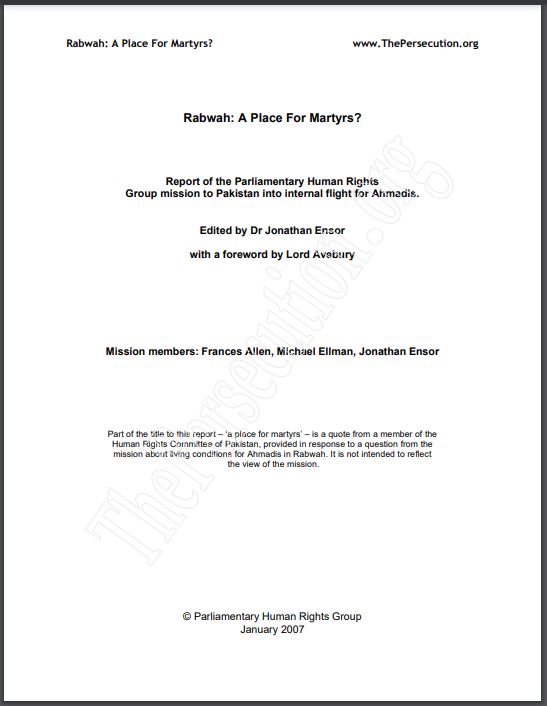
A Place of Maryrs? Report of the Parliamentary Human Rights Group mission to Pakistan into internal flight for Ahmadis.
“The situation faced by some members of the Ahmadi community in Pakistan has prompted them to flee the country and seek asylum in the UK. In the course of deciding on the merits of these claims it has been repeatedly suggested that Ahmadis have an ‘internal flight alternative’ available to them: in short, that by moving to Rabwah, a persecuted Ahmadi would be able to gain security without leaving Pakistan. This assessment is based on the assumption that as Ahmadis form the majority community in Rabwah, the town is able to offer protection to Ahmadis suffering persecution elsewhere in Pakistan. The Parliamentary Human Rights Group identified this assumption as key to many asylum claims and sought to test its veracity. A mission to Pakistan, focussing on Rabwah and recorded in this report, was the result.”
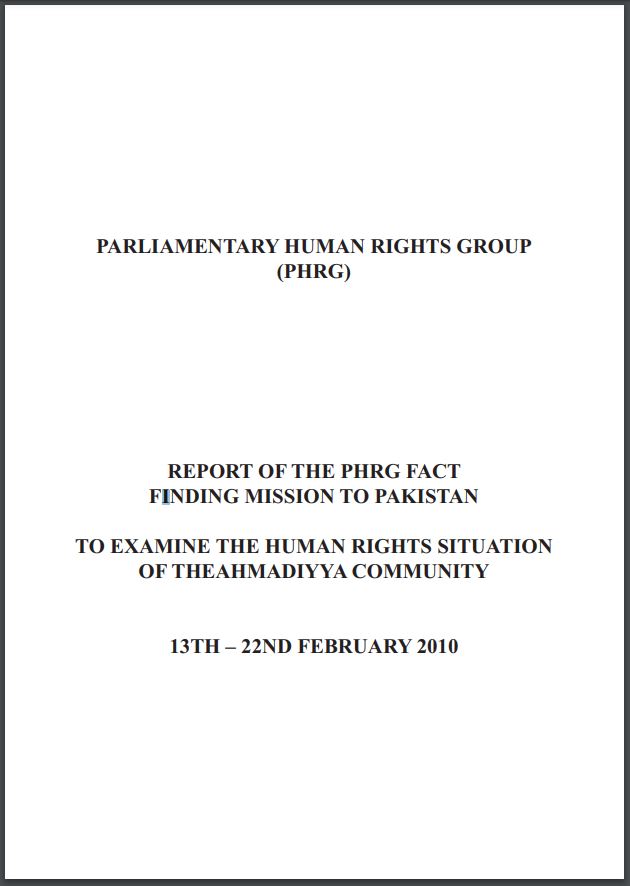
Report of the PHRG – To Examine the Human Rights Situation of the Ahmadiyya Community
On the basis of the evidence gathered in the course of the visit, the Mission found that.
- the Constitution and the laws of Pakistan discriminate against religious minorities;
- criminal laws meant to protect Islam are being used to persecute and intimidate religious minorities;
- the fear of mob violence and of extremist Islamic groups is such that law enforcement agencies, justice institutions and state actors are unwilling to protect the rights of religious minorities;
- violence against and persecutions of religious minorities is often treated with impunity; and
- the state has not shown any willingness to reform the law in order to better protect the human rights of religious minorities.
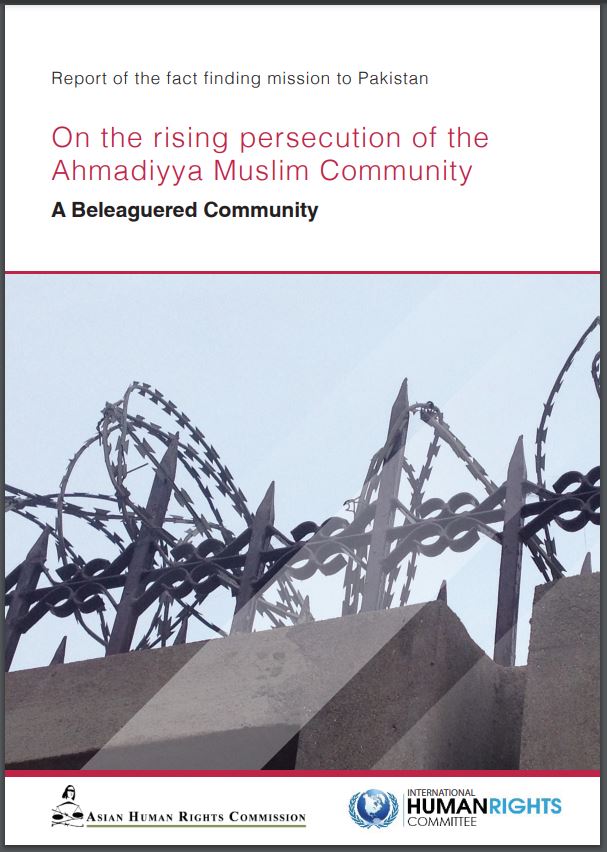
A Beleaguered Community, Report of the fact-finding mission to Pakistan
This report clearly demonstrates that Ahmadis in Pakistan are violently targeted, intimidated, harassed and persecuted at all levels of society. The report provides the historical context to these gross human rights violations directed at the Ahmadi community with the approval of the Second Amendment to the Constitution in 1974 declaring Ahmadis Non-Muslims.
The report shows in great detail how the Blasphemy legislation and Ahmadi-specific repressive laws are implemented on a daily basis at a political, economic, social and educational level affecting Ahmadis from all sectors of society and of all ages. This repressive legislation and state-endorsed compliance have had traumatic consequences for all Ahmadis as they continue to live in fear of daily persecution by the state, the judiciary, the police, religious vigilantes, media and the general public, thus effectively denying them their most basic fundamental entitlements of religious freedom and human rights.
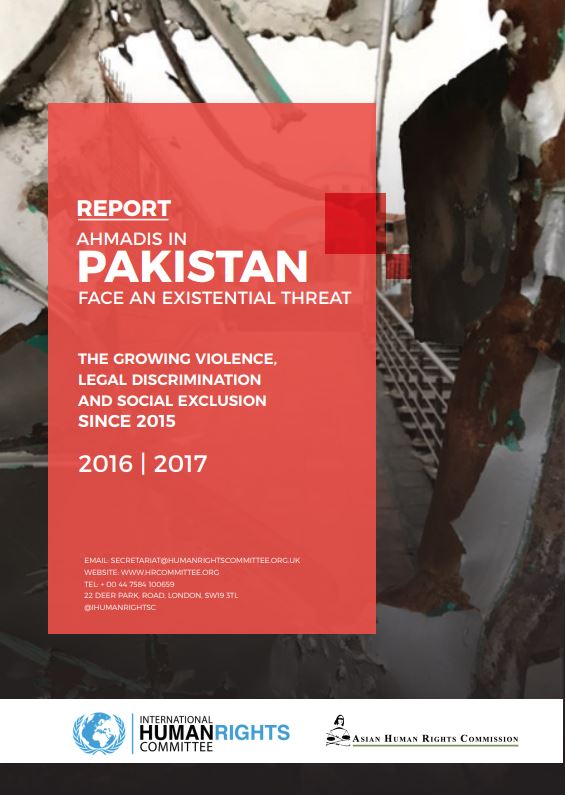
AHMADIS IN PAKISTAN FACE AN EXISTENTIAL THREAT
The purpose of this report is to assess the human rights and security situation of the Ahmadi community in Pakistan, and more specifically to identify and analyze trends
emerging since the beginning of 2015. In December 2014, on behalf of the International Human Rights Committee and the Asian Human Rights Commission, a group of independent human rights experts undertook a fact-finding mission to assemble facts about the persecution of the Ahmadi community in Pakistan. The report1 that was produced was the first comprehensive report specifically focusing on Ahmadi persecution.
Subsequently, the International Human Rights Committee (IHRC) and Asian Human Rights Commission (AHRC) supported by the Forum for Religious Freedom – Europe (FOREF) and Christian Solidarity Worldwide (CSW) assembled a team that visited Pakistan in April 2017.
The team met and interviewed leaders of the Ahmadi community; students in primary, secondary and university institutions; professionals; workers; journalists; human rights officials; victims and members of victims’ families.
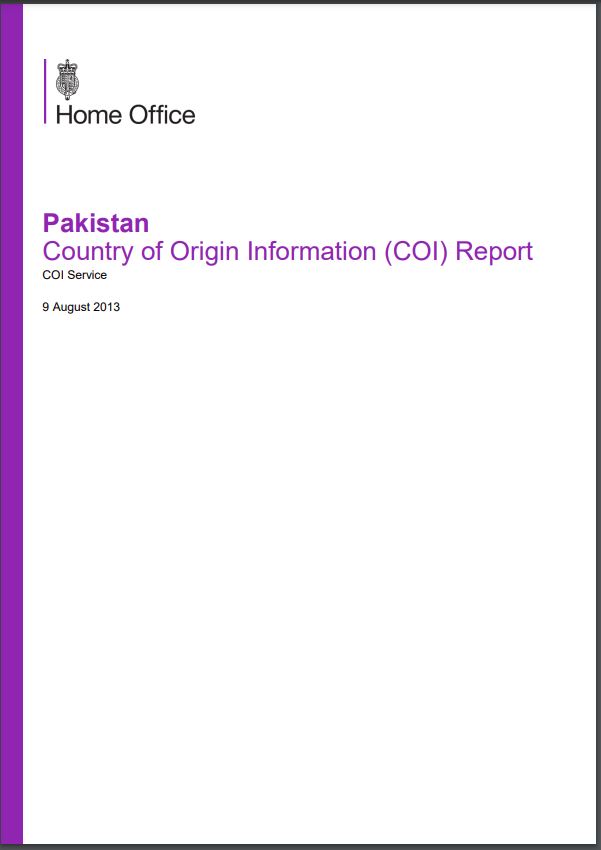
Pakistan, Country of Origin Information (COI) Report 2013 – Home Office UK
The report is a compilation of extracts produced by a number of information sources. In compiling the report no attempt has been made to resolve discrepancies between information provided in different source documents though COI Service will bring the discrepancies together and aim to provide a range of sources, where available, to ensure that a balanced picture is presented. For example, different source documents often contain different versions of names and spellings of individuals, places and political parties, etc. Reports do not aim to bring consistency of spelling but to reflect faithfully the spellings used in the original source documents. Similarly, figures given in different source documents sometimes vary and these are simply quoted as per the original text. The term ‗sic‘ has been used in this document only to denote incorrect spellings or typographical errors in quoted text; its use is not intended to imply any comment on the content of the material.
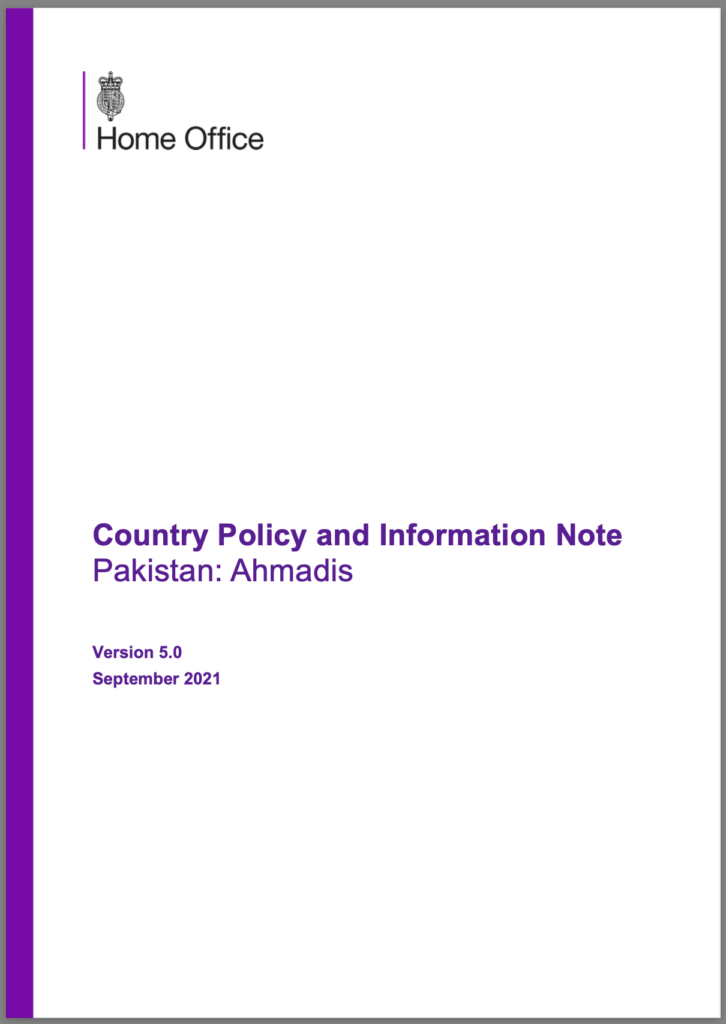
Country Policy and Information Note Pakistan: Ahmadis
This note provides country of origin information (COI) and analysis of COI for use by Home Office decision makers handling particular types of protection and human rights claims (as set out in the Introduction section). It is not intended to be an exhaustive survey of a particular subject or theme.
It is split into 2 parts: (1) an assessment of COI and other evidence; and (2) COI. These are explained in more detail below.
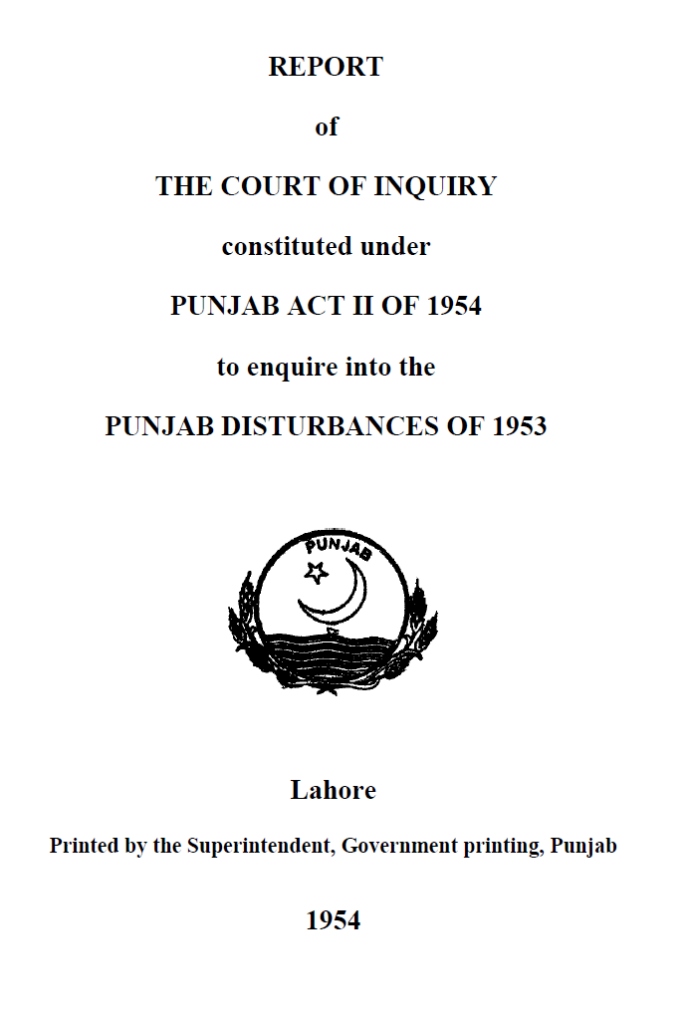
It is fitting to review the whole situation.
Everybody was agreed that the Ahrar were a subversive force. They were opposed to the creation of Pakistan and even Sardar Abdur Rab Nishtar thinks that they were anxious to “rehabilitate” themselves. In 1950 and again in 1952, Mr. Anwar Ali, then D. I.-G, (C. I. D.) strongly recommended that they should be declared an unlawful body. Mr. Qurban Ali Khan wrote very strong and prophitic notes on the possible consequences of neglect. One lawlessness breeds another. One damn thing leads to another. But whenever there was a conference, either they were persuaded to change their strong views, or official decorum restrained them from protesting. Mr. Daultana, therefore, says that everybody agreed with whatever decision we find on the files, and the officers concerned have not contradicted him. We ought to hold, therefore, that the responsibility was joint, though we feel differently.
Further, we feel that the Ahrar were treated as members of the family and the Ahmadis as strangers. The Ahrar behaved like the child whom his father threatens with punishment for beating a stranger, but, who, knowing that he will not be punished, beats the stranger again. Then, out of sheer embarrassment, since other people are watching, his father does strike him—but gently.
And so, as the Central Government was constantly inquiring, and C. I. D. notes were mounting pile upon pile, a conference was held on the 25th of May 1952, and it was decided to ban all Ahrar and Ahmadi meetings. This was good enough, but by the 5th of July it was whittled down to a mere nothing. Let processions be taken out, let meetings be held, in defiance of the ban. Let nobody be arrested—except the Ahrar, Let no Ahrar be arrested—except the prominent Ahrar. Let no prominent Ahrar be arrested, if he addresses a meeting not organised by his own party, without reference to Government….(pg 384)